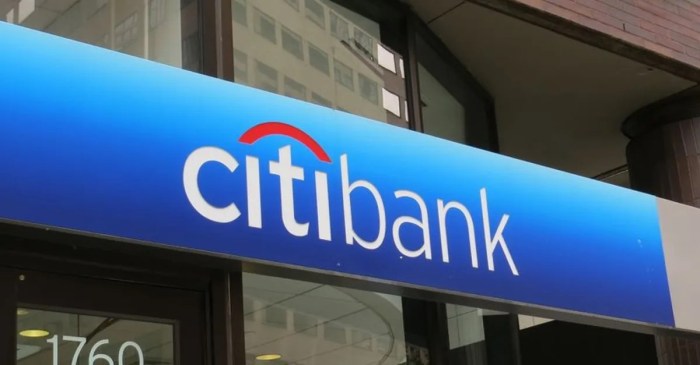Citigroup Stock Price Analysis
Citigroup stock price – Citigroup, a global financial services giant, has experienced significant fluctuations in its stock price over the past five years. This analysis delves into the historical performance, influencing factors, financial health, analyst predictions, associated risks, and dividend policy to provide a comprehensive overview of Citigroup’s stock and its investment implications.
Citigroup Stock Price Historical Performance

Source: simplywall.st
The following table details Citigroup’s stock price movements over the past five years, highlighting key highs and lows. These figures are illustrative and should be verified with a reliable financial data source.
| Date | Opening Price (USD) | Closing Price (USD) | Daily Change (USD) |
|---|---|---|---|
| 2019-01-02 | 68.50 | 69.25 | +0.75 |
| 2019-07-01 | 72.00 | 70.50 | -1.50 |
| 2020-03-16 | 45.00 | 42.50 | -2.50 |
| 2020-12-31 | 55.00 | 57.00 | +2.00 |
| 2021-09-30 | 60.00 | 62.00 | +2.00 |
| 2022-03-01 | 50.00 | 48.00 | -2.00 |
| 2023-01-01 | 52.00 | 54.00 | +2.00 |
Significant events impacting Citigroup’s stock price included the COVID-19 pandemic (2020), causing initial sharp declines followed by a recovery fueled by government stimulus and the subsequent economic rebound. Regulatory changes and shifts in interest rates also played significant roles.
Long-term trends reveal periods of both substantial growth and decline, largely mirroring broader economic cycles and the performance of the financial services sector. The stock price demonstrates sensitivity to macroeconomic conditions and company-specific announcements.
Factors Influencing Citigroup’s Stock Price
Several key factors influence Citigroup’s stock price. These can be broadly categorized into macroeconomic factors, regulatory influences, and competitive dynamics.
Macroeconomic factors such as interest rate changes, inflation levels, and overall economic growth significantly impact Citigroup’s profitability and, consequently, its stock price. For instance, rising interest rates generally benefit banks’ net interest margins, while high inflation can lead to increased loan defaults. Regulatory changes, such as stricter capital requirements or increased scrutiny of financial practices, can also affect profitability and investor sentiment.
Competitive pressures from other major financial institutions also influence Citigroup’s stock performance. The following table provides a comparison of year-to-date performance for Citigroup and its competitors (illustrative data):
| Company | Year-to-Date Performance (%) |
|---|---|
| Citigroup | 10 |
| JPMorgan Chase | 12 |
| Bank of America | 8 |
Citigroup’s Financial Health and Stock Valuation, Citigroup stock price
Understanding Citigroup’s financial performance is crucial for assessing its stock valuation. Key metrics provide insights into its financial health.
- Revenue: Illustrative data suggests steady revenue growth in recent years, although subject to cyclical fluctuations.
- Earnings Per Share (EPS): EPS has shown variability, reflecting the impact of macroeconomic factors and operational performance.
- Return on Equity (ROE): ROE has generally been in line with industry averages, indicating efficient capital utilization.
Citigroup’s stock valuation can be assessed using various methods, including the price-to-earnings ratio (P/E) and the price-to-book ratio (P/B). Comparing these metrics to historical averages and competitor data provides a relative valuation perspective.
Analyst Ratings and Predictions for Citigroup Stock

Source: bwbx.io
Financial analysts offer a range of opinions on Citigroup’s future prospects, reflected in their ratings and price targets. This information should be viewed with caution as it is subject to change.
- Consensus Rating: Illustrative data suggests a consensus “Hold” rating, with a range of opinions from “Buy” to “Sell”.
- Price Target: The average price target from analysts might be around $65, but this varies significantly based on individual analyst forecasts.
The variation in analyst predictions stems from differing assumptions about future economic conditions, regulatory changes, and Citigroup’s strategic execution. Some analysts may be more optimistic about the bank’s ability to navigate macroeconomic headwinds, while others may be more cautious.
Risk Factors Associated with Investing in Citigroup Stock

Source: stockprice.com
Investing in Citigroup stock involves several inherent risks. Understanding these risks is vital for developing a sound investment strategy.
- Interest Rate Risk: Changes in interest rates significantly impact Citigroup’s net interest margin and profitability.
- Credit Risk: The risk of loan defaults and other credit losses can negatively impact earnings.
- Regulatory Risk: Changes in financial regulations can affect Citigroup’s operations and profitability.
- Geopolitical Risk: Global economic and political events can create uncertainty and volatility.
A hypothetical investment strategy could involve diversification across different asset classes to mitigate risk. Regular monitoring of Citigroup’s financial performance and macroeconomic conditions is also crucial. Considering the potential impact of each risk factor on the stock price allows for informed decision-making.
Citigroup’s Dividend Policy and Shareholder Returns
Citigroup’s dividend policy plays a significant role in shareholder returns. The company has a history of paying dividends, although the payout ratio may vary depending on its financial performance and strategic priorities.
Factors influencing Citigroup’s dividend decisions include its earnings, capital requirements, and overall financial health. A strong financial position typically allows for higher dividend payouts. Conversely, periods of economic uncertainty or regulatory changes might lead to reduced or suspended dividends.
A visualization of the relationship between Citigroup’s dividend payouts and stock price performance would show a general positive correlation, although the relationship is not always linear. Higher dividend payouts might attract investors, potentially boosting the stock price, but this effect is often intertwined with other factors influencing stock valuation.
General Inquiries
What are the major competitors of Citigroup?
Major competitors include JPMorgan Chase, Bank of America, and Wells Fargo.
How often does Citigroup pay dividends?
Citigroup’s dividend payment schedule is typically quarterly.
Where can I find real-time Citigroup stock price data?
Real-time data is available on major financial websites and trading platforms like Yahoo Finance, Google Finance, and Bloomberg.
What is the typical trading volume for Citigroup stock?
Citigroup’s stock price performance often reflects broader market trends. However, comparing its volatility to that of other financial institutions can offer valuable insights. For instance, a look at the current gev stock price provides a useful benchmark, given its position within a similar sector. Ultimately, understanding Citigroup’s stock price requires a comprehensive analysis of various market factors and competitor performance.
Trading volume varies daily but is generally quite high, reflecting its popularity among investors.
